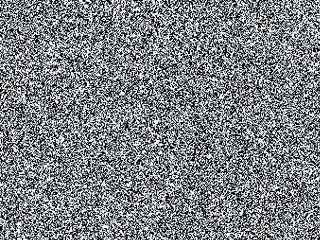
TV snow, soon to join the record-needle scratch and the dial tone in technology oblivion.
It’s well-known that the entertainment industry has its own distinct and secret language. Variety magazine’s slanguage is infamous, in which “mitting” is applause, a “skein” is a TV series, an “oater” is a western, and, most confusing of all for a veteran Internet developer like me, the major TV networks are called “webs.”
I was in a meeting last week with some hard-core video people. No, they weren’t pornographers, rather they were video technology people who live and breathe video tech in all its myriad forms: broadcast, satellite feeds, microwaves, video tape, DVD, high-def, cable, streaming over the Internet, you name it.
They had their own jargon as well, beyond Varietyese. There were the countless technology acronyms and obscure formats, but there was also a hefty dose of outright code words for everyday familiar terms. They used the word “linear” to mean plain old “cable TV”, for example.
Most confusing of all was they way they used the term “broadband” whenever they were listing all of the different channels by which video can be delivered (as in “We can provide you with a feed via linear, [list of incomprehensible acronyms], broadband, you name it.”)
What did that mean? Is there some kind of broadband delivery channel that is distinct from dial-up channels?
To a (world wide) web person like me, “broadband” is a very particular term referring to DSL, cable modems, and other high-speed types of Internet connections. Broadband is, to me, the same basic animal as, say, a dial-up Internet connection, just faster. I only use the term to distinguish between types of Internet connections, not to refer to an essential type of data transmission channel. I figured they must have been talking about something else, some fancy new kind of cable service that we New Yorkers don’t know about yet.
Turned out they simply meant “the Web”. To the broadcast industry, the Web might as well have not existed when it was still in the dial-up era. If you couldn’t stream video over it, it was useless to them. But when broadband arrived, suddenly the Web became a viable distribution channel to them. Suddenly it became relevant. So instead of calling it “the Web” like everyone else, they call it “broadband” because that’s what we web people were all excited about when they finally took notice of us (and, of course, since they already call the TV networks “webs” they needed another term anyway).
The Old Guard

According to old-school cable industry player Leo Hinderly, the web is primarily a content distribution medium for the content currently owned by the broadcast industy. John Batelle’s critique of Hinderly’s profound naivete is spot-on. It’s not just a stereotype — sometimes it really does look like the TV people just don’t get the Internet at all.
We Internet people are pretty snobby about our field. We often proclaim that the TV people are going to go extinct as the anytime/anywhere net supplants the central-control broadcast model. Still, the entertainment industry in all its forms is smart and scrappy. The movie industry survived and flourished despite the advent of television, the VCR, and DVD. The TV networks in particular have a proven record of defeating adversity. They survived cable, big time, by controlling it instead of opposing it.
These lumbering giants just might eventually figure out a way to exercise some significant control over the internet as well: the dot-coms lay the groundwork today, and the broadcasters sweep in and take control later. Don’t write them off.
Comments
4 responses to “Video Lingo vs. Web Lingo: What is “Broadband”?”
The muddying of the meaning of “broadband” has also puzzled me in the past, but this is the first place I’ve seen it brought up. Like you I always thought of broadband as shorthand for “broadband internet connection.” The first time I noticed the expansion in meaning was back when AT&T Broadband was AT&T’s cable and internet arm. It seemed at the time like they were trying to turn “broadband” from a well-defined term into a vague expression for “all-purpose multimedia conduit,” or perhaps something even more fuzzily defined. It definitely irritated me to hear the term broadband be applied to cable TV, though.
I guess my interpretation of the “why” of this shift in meaning was that it was simply a deliberate attempt to get you to associate one service that was outside of AT&T’s traditional competencies (cable) with one that was within its competencies (internet), since if you begun to associate those two, you might be more likely to get your cable from AT&T as well as your internet, and thus help AT&T expand into a new market. Your “they don’t understand the internet” idea is interesting though, and probably more accurate.
I did think that this notion of an expanded definition of broadband had died with the sale of AT&T Broadband to Comcast, though. Interesting to hear that the meaning of the term is still in flux.
John: Over at Organic’s threeminds blog, there’s a post about Verizon’s new web promotions for their broadband service. At one point the post says “Ironically, you can only experience these rich sites if you already have a broadband connection.”, which sort of implies that the site won’t work at all unless you are connected via broadband. I know that they mean “you can only have a good experience if you already have broadband”, but it nonetheless struck me as yet another sign that dial-up is being written off completely. Which is of course good news.
Incidentally, Verizon seems to be framing their own broadband product, which supposedly is direct-to-the-premises fiber optics, as the “true” broadband — while those of us with DSL and cable modems are, I guess, not-quite-broadband. I suppose “broadband” will always mean “faster than whatever you have now”.
Good point about “good experience”… they should say what they mean 🙂
m
Mark: I thought of you when italicising that, too!